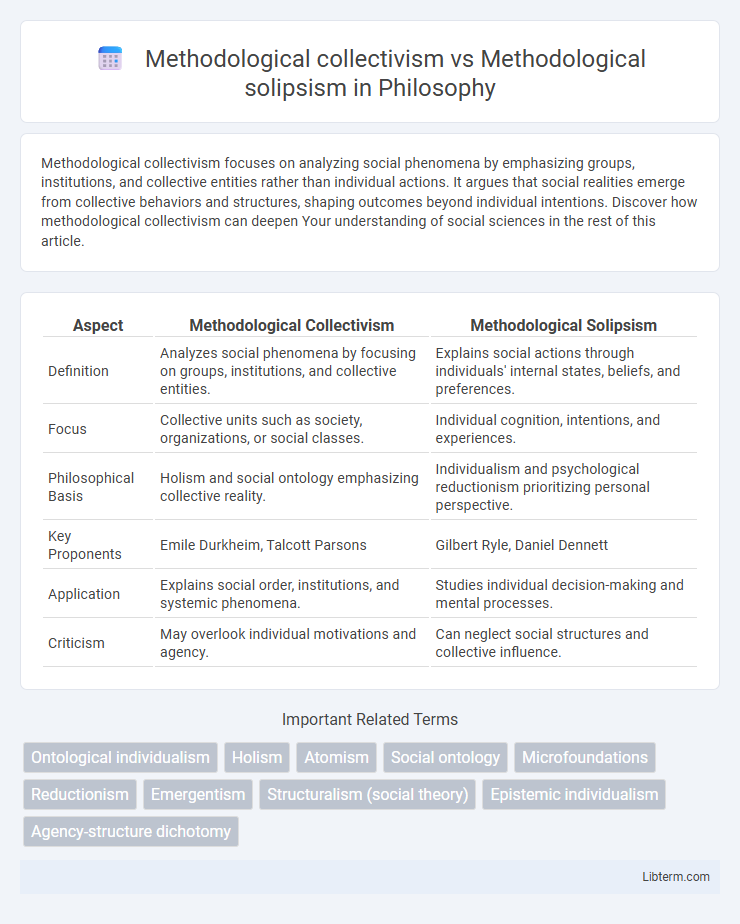Methodological collectivism focuses on analyzing social phenomena by emphasizing groups, institutions, and collective entities rather than individual actions. It argues that social realities emerge from collective behaviors and structures, shaping outcomes beyond individual intentions. Discover how methodological collectivism can deepen Your understanding of social sciences in the rest of this article.
Table of Comparison
| Aspect | Methodological Collectivism | Methodological Solipsism |
|---|---|---|
| Definition | Analyzes social phenomena by focusing on groups, institutions, and collective entities. | Explains social actions through individuals' internal states, beliefs, and preferences. |
| Focus | Collective units such as society, organizations, or social classes. | Individual cognition, intentions, and experiences. |
| Philosophical Basis | Holism and social ontology emphasizing collective reality. | Individualism and psychological reductionism prioritizing personal perspective. |
| Key Proponents | Emile Durkheim, Talcott Parsons | Gilbert Ryle, Daniel Dennett |
| Application | Explains social order, institutions, and systemic phenomena. | Studies individual decision-making and mental processes. |
| Criticism | May overlook individual motivations and agency. | Can neglect social structures and collective influence. |
Introduction to Methodological Collectivism and Solipsism
Methodological collectivism emphasizes analyzing social phenomena through the actions and interactions of groups or institutions rather than isolated individuals. Methodological solipsism prioritizes individual cognitive processes and decision-making as the fundamental units for understanding social reality. These contrasting approaches shape diverse research methodologies in social sciences, highlighting group dynamics versus individual cognition in explaining social behavior.
Defining Methodological Collectivism
Methodological collectivism defines social phenomena through the behaviors, norms, and structures of groups rather than individuals. It emphasizes that collective entities, such as institutions or social classes, possess properties and causal powers that shape individual actions and societal outcomes. This approach contrasts with methodological solipsism, which explains social reality solely based on individual beliefs and intentions without acknowledging group dynamics.
Explaining Methodological Solipsism
Methodological solipsism is an epistemological approach in social sciences that analyzes individual behavior strictly based on the mental states and beliefs of the agent, excluding external social realities or structures. This framework prioritizes how individuals' internal psychological processes, such as intentions and desires, determine their actions without referencing collective influences. By isolating cognitive factors, methodological solipsism contrasts with methodological collectivism, which emphasizes social contexts and institutional forces shaping behavior.
Historical Origins and Key Thinkers
Methodological collectivism originated in the works of Emile Durkheim, who emphasized social facts and collective phenomena as fundamental units of analysis, contrasting sharply with the individual-centered approach of methodological solipsism. Key thinkers of methodological solipsism include Max Weber and Ludwig Wittgenstein, who focused on individual intentions and meanings as primary to social sciences. The historical debate between these perspectives highlights the tension between analyzing social realities through collective structures versus individual cognitive processes.
Central Differences Between the Two Approaches
Methodological collectivism emphasizes analyzing social phenomena by considering groups, institutions, and collective structures as primary units of explanation, highlighting how social outcomes emerge from interactions within these entities. Methodological solipsism, in contrast, focuses on individual agents' mental states, decisions, and actions as the sole basis for understanding social phenomena, often disregarding broader social contexts. The central difference lies in the level of analysis: collectivism prioritizes macro-level social dynamics, while solipsism concentrates on micro-level individual cognition and behavior.
Impacts on Social Science Research
Methodological collectivism emphasizes the study of social phenomena through collective entities such as institutions, groups, and societal structures, shaping social science research to prioritize macro-level analysis and systemic influences. Methodological solipsism, in contrast, focuses on individual cognition and mental states as fundamental units of analysis, driving research towards understanding social behavior from micro-level psychological processes. The choice between these approaches impacts data collection, theory development, and interpretations, influencing the explanatory scope and granularity in fields like sociology, economics, and political science.
Applications in Psychology and Sociology
Methodological collectivism emphasizes analyzing social phenomena by examining group structures and collective behaviors, which is widely applied in sociology to understand societal norms, institutions, and group dynamics. In psychology, methodological solipsism focuses on individual cognitive processes and subjective experiences, facilitating research on mental representations and personal decision-making. These contrasting approaches guide researchers in selecting levels of analysis, with collectivism suited for social systems research and solipsism for studying internal psychological mechanisms.
Critiques and Controversies
Methodological collectivism faces critiques for potentially overlooking individual agency by emphasizing social structures and collective phenomena, which some argue leads to reductive explanations. Methodological solipsism encounters controversy due to its isolation of individual mental states from social context, prompting debates about its inability to account for social interactions and intersubjective meanings. Both approaches provoke ongoing discussion about balancing the explanatory power of individual cognition against the influence of social environments in social science research.
Methodological Implications for Future Studies
Methodological collectivism emphasizes analyzing social phenomena through group dynamics and collective behavior, guiding future studies to incorporate systemic interactions within societal contexts. Methodological solipsism prioritizes individual cognitive processes as primary units of analysis, directing research toward internal mental states and subjective experiences. Integrating these approaches enriches methodological frameworks by balancing macro-level social structures with micro-level individual agency, thereby enhancing the robustness of empirical investigations.
Conclusion: Choosing the Appropriate Approach
Methodological collectivism emphasizes understanding social phenomena through the interactions and structures of groups, providing comprehensive insights into collective behavior and institutions. Methodological solipsism focuses on individual actions and intentions, offering precision in analyzing personal decision-making processes but potentially overlooking broader social contexts. Choosing the appropriate approach depends on research goals: collectivism suits studies requiring macro-level explanations, while solipsism fits investigations centered on micro-level individual motivations.
Methodological collectivism Infographic

 libterm.com
libterm.com